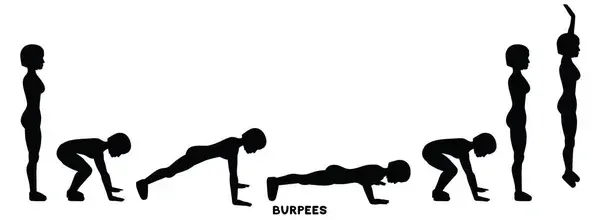“Can I do burpees while pregnant?” is like asking if it’s safe to take a challenging hike up a steep mountain while carrying a heavy backpack.
Can you do burpees when pregnant? This question often comes up, especially for those in their first trimester.
However, it’s essential to recognize that burpees involve movements like jumping, squatting, and lying down, which could potentially strain joints and abdominal muscles, not to mention the pelvic floor.
This raises concerns about whether burpees are safe during pregnancy, particularly in the first trimester.
Are you an expectant mom wondering about the safety of burpees during pregnancy? We’ve got you covered! Staying active during pregnancy is vital for your overall well-being, but it’s essential to know which exercises are safe.
In this article, we’ll explore the question, “Can I do burpees while pregnant?” and provide you with all the information you need to make an informed decision about your fitness routine.
Let’s dive in and find out what’s best for you and your baby.
Can I Do Burpees While Pregnant?
No, it is not recommended to do burpees while pregnant without consulting with your healthcare provider first.
“Can you do burpees while pregnant?” is a common question that arises among expectant mothers.
It’s important to note that engaging in physical activities during pregnancy should be approached with caution.
In fact, it’s advised to consult your healthcare provider before attempting exercises like burpees when pregnant.
Burpees involve a combination of jumping, squatting, and lying down, which can put significant stress on your joints, abdominal muscles, and pelvic floor.
During pregnancy, your body undergoes various changes, including hormonal and musculoskeletal adjustments that can affect your stability and balance.
Additionally, the intensity and impact of burpees may not be suitable for all pregnant women, especially those with certain medical conditions or complications. It is crucial to consider your individual health status, the stage of your pregnancy, and any specific risks or concerns you may have.
To make informed decisions about exercise during pregnancy, it is best to consult with your healthcare provider. They can evaluate your medical history, conduct a physical examination, and provide personalized recommendations based on your unique circumstances.
In conclusion, can you do burpees pregnant? The consensus is that it’s best to proceed with caution and consult your healthcare provider before attempting exercises that could potentially impact your well-being and that of your baby.
Every pregnancy is unique, so always prioritize seeking professional guidance and ensuring your health and safety throughout this journey.
Remember, every pregnancy is different, and what may be appropriate for one person may not be suitable for another. Always prioritize your health and the well-being of your baby by seeking professional guidance from your healthcare provider.
Understanding the Physiology of Pregnancy
Pregnancy is an incredible journey filled with numerous changes and adaptations within a woman’s body. Understanding the physiology of pregnancy is essential to make informed decisions about exercise, including the question of whether burpees are safe during this time.
- Changes in the Body during Pregnancy
Pregnancy brings about significant transformations in a woman’s body. Hormonal fluctuations, increased blood volume, and expanding uterus are just a few of the remarkable changes that occur. These changes support the growth and development of the baby, but they can also impact how the body responds to physical activity. - Hormonal and Musculoskeletal Adjustments
Hormones like relaxin, which relaxes ligaments, and progesterone, which affects muscle tone, play important roles during pregnancy. These hormonal changes can result in increased joint laxity and decreased stability. Additionally, the growing baby places additional stress on muscles and joints, altering their biomechanics. - Impact on Stability, Balance, and Joint Health
Due to hormonal and musculoskeletal adjustments, pregnant women may experience changes in stability, balance, and joint health. The shifting center of gravity and increased pressure on the pelvic floor can affect posture and stability. It is crucial to consider these factors when evaluating the safety of exercises like burpees.
Benefits of Exercise During Pregnancy
Maintaining physical fitness during pregnancy offers numerous benefits for both the mother and the baby. Engaging in regular exercise, tailored to the specific needs of pregnancy, can contribute to a healthier and more comfortable experience overall.
- Importance of Maintaining Physical Fitness during Pregnancy
Staying physically active during pregnancy helps improve cardiovascular health, manage weight gain, enhance mood, and reduce the risk of gestational diabetes and preeclampsia. Exercise can also aid in maintaining muscle tone and strength, which can be beneficial during labour and postpartum recovery. - Potential Benefits for Both Mother and Baby
Regular exercise during pregnancy has been associated with a range of benefits. It can improve maternal stamina and endurance, promote better sleep quality, reduce pregnancy discomforts, and help prevent excessive weight gain. Furthermore, babies of active mothers may have lower birth weights and a reduced risk of certain health conditions. - Overview of Recommended Exercises during Pregnancy
Not all exercises are suitable for pregnant women, but there are many safe options. Low-impact activities such as walking, swimming, stationary cycling, and prenatal yoga are often recommended. These exercises provide cardiovascular benefits, improve strength and flexibility, and minimize the risk of injury.
Burpees: What They Involve

Burpees are high-intensity exercise that involves a combination of squatting, jumping, and lying down. While burpees can be an effective full-body workout for some individuals, it is crucial to assess their suitability during pregnancy.
- Description and Demonstration of Burpees
Burpees typically begin in a standing position, followed by a squat, a push-up, and a jump back to standing. They are designed to target multiple muscle groups and elevate heart rate. - Intensity and Impact on the Body
Burpees are known for their high intensity and ability to elevate heart rate rapidly. They place significant stress on joints, muscles, and connective tissues, requiring strength, stability, and coordination. - Potential Risks and Considerations for Pregnant Women
Due to the dynamic and strenuous nature of burpees, they may not be appropriate for all pregnant women. The jumping, impact, and sudden changes in position can increase the risk of falls, strain on the pelvic floor, and potential harm to the developing baby.
Remember, always prioritize your safety and the well-being of your baby. Consult with your healthcare provider to determine if burpees or alternative exercises are suitable for your individual circumstances.
Safety Concerns and Considerations
When it comes to exercising during pregnancy, safety should always be the top priority. Several important safety concerns and considerations arise when contemplating the practice of burpees.
1. Impact on Abdominal Muscles and Pelvic Floor
Burpees involve rapid movements that can put a strain on the abdominal muscles and pelvic floor, which already undergo significant changes during pregnancy. Excessive pressure on these areas may contribute to diastasis recti (separation of the abdominal muscles) or pelvic floor dysfunction.
2. Potential Strain on Joints and Ligaments
The hormonal changes during pregnancy lead to increased joint laxity and may make pregnant women more susceptible to strains or injuries. Burpees, with their repetitive jumping and quick transitions, can potentially exacerbate joint instability and pose a risk of musculoskeletal damage.
3. Effect on Cardiovascular System and Body Temperature Regulation
Pregnancy naturally affects the cardiovascular system, with an increased blood volume and heart rate. Engaging in high-intensity exercises like burpees may further elevate the heart rate to levels that might not be advisable during pregnancy. Additionally, the rise in body temperature during intense exercise could potentially affect the developing baby.
4. Pre-existing Medical Conditions and Complications
It is crucial to consider any pre-existing medical conditions or pregnancy complications that could impact the safety of exercising, including the performance of burpees. Certain conditions such as gestational diabetes, high blood pressure, or a history of premature labor may require modifications or restrictions in exercise routines.
Consulting with a Healthcare Provider
Given the individual nature of pregnancy and the diverse range of circumstances, it is essential to consult with your healthcare provider before engaging in any exercise regimen, including burpees.
1. Importance of Individualized Advice
Every pregnancy is unique, and what may be suitable for one woman might not be appropriate for another. Your healthcare provider will consider your medical history, current health status, and any specific concerns or risks to provide personalized guidance.
2. Discussing Exercise Plans with Obstetrician or Healthcare Provider
Schedule a conversation with your obstetrician or healthcare provider to discuss your desire to exercise during pregnancy. They will evaluate your overall health and provide recommendations based on their expertise and knowledge of your individual situation.
3. Medical History Evaluation and Physical Examination
Your healthcare provider will review your medical history and conduct a physical examination to assess your readiness for exercise. They may consider factors such as your pre-pregnancy fitness level, any previous pregnancies, or specific risk factors that could influence their advice.
Alternative Exercises During Pregnancy
When it comes to exercising during pregnancy, including burpees while pregnant, it’s highly recommended to seek guidance from your healthcare provider.
This professional can assess your medical history, conduct physical examinations, and offer personalized advice based on your unique circumstances.
While low-impact exercises like walking, swimming, stationary cycling, and prenatal yoga are generally considered safe and beneficial during pregnancy, it’s best to consult your healthcare provider for tailored recommendations.
While burpees may present certain risks during pregnancy, there are various alternative exercises that can provide similar benefits in a safer manner.
1. Low-Impact Exercises Suitable for Pregnant Women
Focus on exercises that are gentle on the joints and minimize the risk of falls or injuries. Walking, swimming, stationary cycling, and prenatal yoga are excellent options that promote cardiovascular health, muscle strength, and flexibility without excessive strain.
2. Examples: Walking, Swimming, Stationary Cycling, Prenatal Yoga
Walking is a simple and accessible exercise that can be adapted to your fitness level. Swimming provides a low-impact full-body workout while reducing pressure on the joints. Stationary cycling is a great option for cardiovascular exercise, and prenatal yoga helps improve strength, flexibility, and relaxation.
3. Benefits of These Alternatives
These alternative exercises offer benefits such as improved circulation, muscle tone, and overall well-being during pregnancy. They can also help alleviate common discomforts and prepare your body for labour and postpartum recovery.
Personalized Approach to Exercise
Adopting a personalized approach to exercise during pregnancy is essential for your safety and well-being. Consider the following aspects when engaging in physical activity.
1. Considering Individual Health Status and Pregnancy Stage
Take into account your current health status, any complications or risks, and the stage of your pregnancy. What may be appropriate in early pregnancy might require modification as your body undergoes changes.
2. Importance of Listening to Your Body and Modifying Exercises
Tune in to your body’s cues during exercise. If something feels uncomfortable, modify or discontinue the exercise. Pay attention to your energy levels and adapt your workout intensity accordingly.
3. Recognizing Limitations and Avoiding Excessive Exertion
Pregnancy is not a time to push yourself to the limits. Respect your body’s capabilities and avoid excessive exertion. Focus on maintaining a moderate level of intensity and ensuring proper form throughout your chosen exercises.
Recommended Articles:
- Top 10 Best Air Purifiers for Pregnancy: Experience Cleaner Air for a Healthier Pregnancy with Our Top Air Purifier Pick
- Stay Hydrated and Healthy: Top 10 Best Water Bottles for Pregnancy
Conclusion
In conclusion “Are burpees safe during pregnancy”? This is a question that many pregnant women ponder.
Given the significant changes your body undergoes, both hormonally and musculoskeletally, during pregnancy, it’s crucial to prioritize stability and balance.
While some pregnant women might consider attempting burpees while pregnant first trimester, it’s wise to consider individual health status, pregnancy stage, and any specific risks or concerns.
Prioritizing safety, consulting with your healthcare provider, and considering alternative exercises that are suitable for pregnancy are key steps in maintaining an active and healthy lifestyle during this special time.
Remember, the health and well-being of both you and your baby are of utmost importance, so always seek professional guidance and listen to your body as you navigate the world of pregnancy and exercise.
Additional Resources and References
If you’re looking for further information on the topic of exercising during pregnancy and the safety of burpees, here are some recommended sources and references to explore:
- American College of Obstetricians and Gynecologists (ACOG) – Visit the ACOG website for comprehensive guidelines on exercise during pregnancy, including recommendations and precautions. They provide evidence-based information to help you make informed decisions.
- Mayo Clinic – The Mayo Clinic offers valuable insights into prenatal fitness and exercise. Their website provides guidance on safe exercises during pregnancy and addresses common concerns.
- National Institutes of Health (NIH) – The NIH offers research articles and studies related to prenatal exercise and its impact on maternal and fetal health. You can access a wealth of scientific information to further educate yourself.
- WebMD – WebMD provides articles and expert advice on exercising during pregnancy. Learn about the benefits of staying active, recommended exercises, and precautions to take.
- Fit Pregnancy and Baby – This resource focuses on fitness and health during pregnancy. It offers a variety of articles and guides, including workout routines, tips, and success stories from other expectant mothers.
Remember to always consult with your healthcare provider for personalized advice and guidance tailored to your specific needs and circumstances.
Frequently Asked Questions (FAQs)
- Can I do burpees while pregnant?
While it’s best to avoid burpees during pregnancy due to the potential risks, it is essential to consult with your healthcare provider for personalized advice based on your unique circumstances. - What are the benefits of exercise during pregnancy?
Exercise during pregnancy offers numerous benefits, including improved cardiovascular health, weight management, better mood, reduced discomfort, and potential advantages for both the mother’s and the baby’s health. - What exercises are recommended during pregnancy?
Recommended exercises during pregnancy include low-impact activities such as walking, swimming, stationary cycling, and prenatal yoga. These exercises provide cardiovascular benefits, improve strength and flexibility, and minimize the risk of injury. - What do burpees involve?
Burpees involve a series of movements, including squatting, push-ups, and jumping, designed to target multiple muscle groups. However, their high intensity and impact on the body may not be suitable for all pregnant women. - What are the potential risks of burpees during pregnancy?
Burpees during pregnancy can potentially strain abdominal muscles and the pelvic floor, place stress on joints and ligaments, and affect the cardiovascular system and body temperature regulation. It is crucial to consider these risks before engaging in this exercise. - How can burpees impact abdominal muscles and the pelvic floor during pregnancy?
Burpees involve movements that can strain the abdominal muscles and pelvic floor, which undergo significant changes during pregnancy. This can contribute to diastasis recti (abdominal muscle separation) or pelvic floor dysfunction. - What safety concerns should I consider during pregnancy exercise?
Safety concerns during pregnancy exercise include the impact on abdominal muscles and the pelvic floor, potential strain on joints and ligaments, effects on the cardiovascular system and body temperature regulation, and any pre-existing medical conditions or complications. - Why is consulting with a healthcare provider important during pregnancy exercise?
Consulting with a healthcare provider is crucial because they can provide individualized advice based on your medical history, current health status, and specific concerns. They can guide you on the safety of exercises like burpees and help you make informed decisions. - What are alternative exercises suitable for pregnant women?
Low-impact exercises such as walking, swimming, stationary cycling, and prenatal yoga are great alternatives to burpees during pregnancy. These exercises provide similar benefits while minimizing the risks associated with high-impact activities. - How should I approach exercise during pregnancy on a personal level?
Taking a personalized approach to exercise during pregnancy involves considering your health status, and pregnancy stage, listening to your body’s cues, modifying exercises as needed, and recognizing your limitations to avoid excessive exertion. Prioritizing safety and seeking professional guidance is essential.













